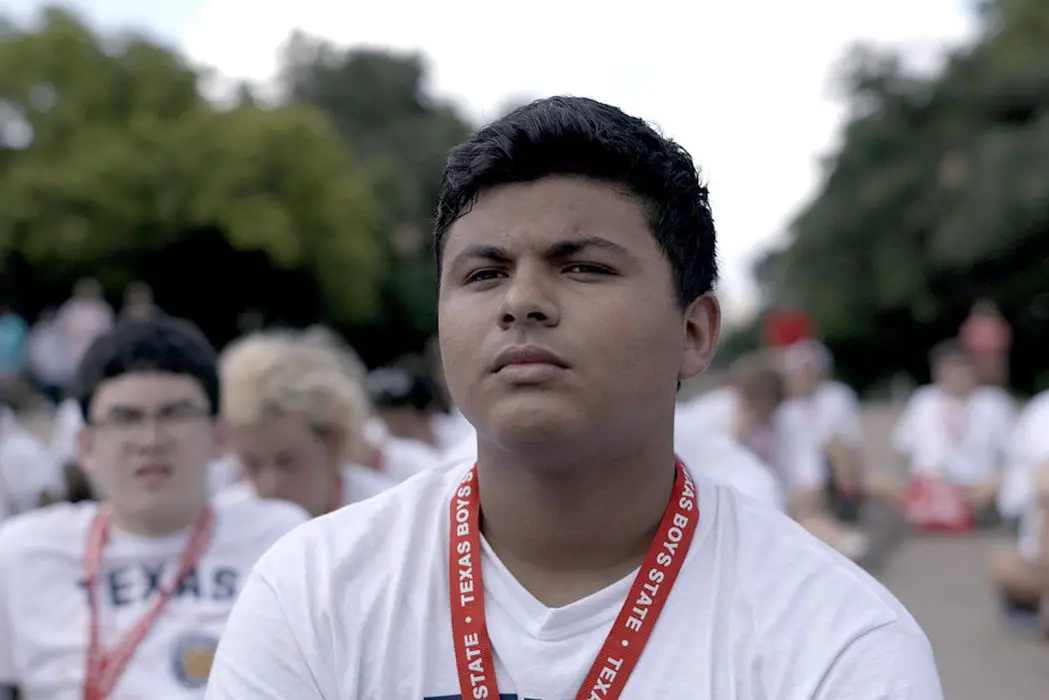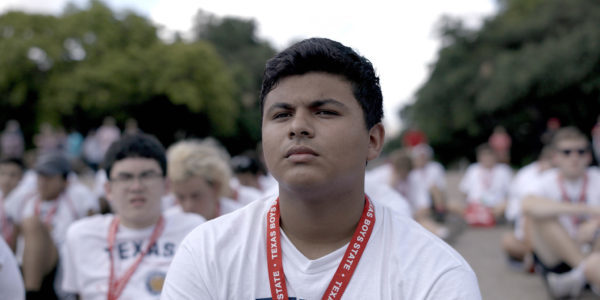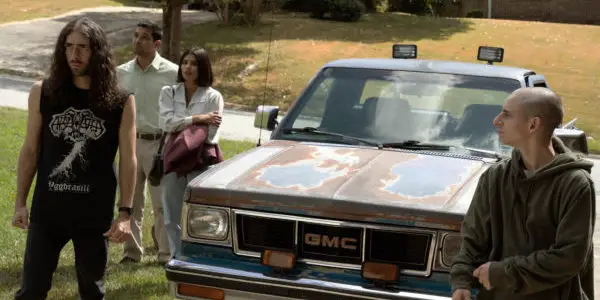Sundance 2020: BOYS STATE & BLAST BEAT

Janet is a writer based in Salt Lake City. A…
My time at this year’s Sundance Film Festival kicked off with Boys State and Blast Beat–two films that capture coming of age experiences of young men. They explore the complexities of male youth affected by political divides, anxiety, and naivety. Boys State from the U.S. Documentary Competition category is a win; Blast Beat from the U.S. Dramatic Competition category, not so much.
Boys State (Amanda McBaine & Jesse Moss)
Centered on politics, Boys State is a coming-of-age story imbued with poignant, honest, and humorous experiences of young men and their legislative inclinations. It intelligently captures the heart of youth and masculinity that not only speaks to our current social and political climate, but the ways in which we decide to play the game and how that changes us. This documentary follows a large class of over a thousand 17-year-old boys who come together in Austin, Texas for Boys State, a selective educational program for high school students that focuses on government instruction and civil discourse. It’s a week-long camp filled with boys of diverse backgrounds and political opinions.
They’re split into two factions—Federalists and Nationalists—and are expected to form their own mock government from the ground up. This involves petitioning, reaching a consensus on central topics, and electing people for political roles, the most important of them all—governor.

We are taken through the high and lows of this experience through four boys: Robert, a rowdy guy who bleeds with a frat-boy persona, Ben, a conservative and political junkie, Rene, a witty and fierce kid who excels at public speaking, and finally, Steven, a soft-spoken and grounded liberal kid.
The way directors Jesse Moss and Amanda McBaine wade through their journeys is compelling, amusing, and heartbreaking. Weaving in high school angst with relevant social and political commentary, the documentary navigates an entertaining story that navigates disappointment, hope, and pesky drama among eager-eyed boys. The directors weave in high school angst with relevant social and political commentary. Material like this can easily make for great reality TV, but Moss and McBaine understand that there are issues and thought processes rooted in these future politicians that deserve careful attention.
As you would imagine with a room full of 17-year-old boys, it involves a lot of rowdy speeches, showy masculinity, memes, and uneasy interactions. There are several different personalities as well. Some are high-strung and some are more soft-spoken that makes the documentary an interesting character study. Though the camp may be comprised of mock debate and elections, it’s everything to these boys. Boys State is a formidable experience that pushes and changes them. And it soon becomes everything to us. Moss and McBaine skillfully flesh out personal journeys and moments that capture the essence of democracy, failure, and success.
Similar to American Factory, a gripping Netflix documentary that premiered last year at the 2019 Sundance Film Festival, Boys State brings together people from different backgrounds that raises questions on identity and the American Dream. They seamlessly stitch humor through hardship and uncertainty that sincerely captures the human spirit. The film bodes well with today’s divided social and political climate. Hearing young men discuss topics such as abortion and gun control is cringe-worthy at times, and we wonder whether their opinions are actually rooted in their values.
Moss and McBaine illustrate that it’s not about being on the left or right, but how you approach politics and debates. The directors draw a line between those who perceive politics as a bloodsport versus those who see it has a genuine platform to listen and strive for the common good. Do you strive for what is easy or for what is right? Which path prevails in the end?
Through all the drama and tension, there’s a fine thread of heart, hope, and bravery woven into the film that makes this a refreshingly satisfying piece of work. Moss and McBaine do a superb and humble job in unfolding stories in ways that help us see matters beyond this small world in Austin. Current with the times and looking ahead at our next generation, Boys State is a relevant documentary that deserves everyone’s attention.
Blast Beat (Esteban Arango)
This Colombian-American film by director and writer Esteban Arango follows two adolescent brothers who immigrate to the U.S. to reunite with their father. These siblings are portrayed onscreen by real-life brothers, Mateo and Moisés Arias. Though their personal relationship permeates through the screen, we can’t help but feel that the components of the film–sound design, cinematography, editing, acting, and narrative–are all seriously detached that makes us pull away.
Carly (Mateo Arias), the older brother is a metal head and science geek who aspires to attend the Georgia Institute of Technology and work for NASA. He’s the loyal child and favorite in the family. Scholarly and respectful towards his elders, Carly is the bright and shining armor. Skater punk Mateo, on the other hand, seeks and thrives off of trouble. A rebel at heart, Mateo is the black sheep in the family, often brewing in jealousy, cynicism, and anger towards Carly’s ambitions and talents.

When the brothers and their mother Nelly, (Diane Guerrero) arrive in Georgia, they’re taken aback to find that their father Ernesto (Wilmer Valderrama) owns a run down pick-up truck and house. They’re a class lower in the U.S. than they were back at home. Not to mention, the boys’ new classmates mix their Colombian background with Spanish and Mexican; it’s all the same to them, and it speaks well to the fact that people have an unfortunate tendency to generalize cultures and ethnicities.
Unlike their classmates, these brothers don’t have the freedom to make mistakes and get into trouble. But as things get out of hand and the family’s future is threatened, the family undergoes extreme challenges to fight for their right to stay. The film relies on music and stylized visuals to capture youthful energy. We’re often taken through scenes that progress in slow motion with heavy metal or rap blasting in the background. There’s also colorful cinematography sprinkled into these scenes, making them a highly visual experience. Though these visceral moments illustrate teen angst, they’re overused and corny.
These scenes don’t do much to propel the story and characters forward. In fact, Arango heavily invests in mood that he forgets to develop his characters and plot. As a result, the sound design, cinematography, editing, and narrative are poorly married together. His characters are banal that they unfortunately do not compel us to stay invested in their journey. And it doesn’t help that the parents played by Guerrero and Valderrama look about the same age as the Arias brothers.
Though there are thoughtful and relevant themes behind the film such as immigration, identity, and masculinity, the film is filled with cliches that it doesn’t bring these topics the justice that they need. It fails to progress towards the maturation that it requires. Simply put, Blast Beat unfortunately fails to find the right beat.
Does content like this matter to you?
Become a Member and support film journalism. Unlock access to all of Film Inquiry`s great articles. Join a community of like-minded readers who are passionate about cinema - get access to our private members Network, give back to independent filmmakers, and more.
Janet is a writer based in Salt Lake City. A strong advocate for underrepresented voices, she believes cinema is a transformative medium that challenges assumptions and creates diverse conversations.













